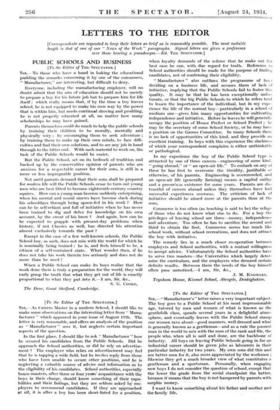LETTERS TO THE EDITOR
[Correspondents are requested to keep their letters as brief as is reasonably possible. The most suitable length is that of one of our " News of the Week " paragraphs. Signed letters are given a preference over those bearing a pseudonym.—Ed. THE SPECTATOR.] PUBLIC SCHOOLS AND BUSINESS [To the Editor of THE SPECTATOR.] SIR,—To those who have a hand in baking the educational pudding the remarks concerning it by one of the consumers, " Manufacturer," are interesting, but difficult to deny.
Everyone, including the manufacturing employer, will no doubt admit that the aim of education should not be merely to prepare a boy for his future job but to prepare him for life itself : which really means that, if by the time a boy leaves school, he is not equipped to make his own way by the power that is within him, but needs continual shoving and prodding, he is not properly educated at all, no matter how many scholarships he may have gained.
Parents themselves could do much to kelp the public schools by training their children to be morally, mentally and physically wiry : by encouraging them to seek adventure ; by training them to make up their own minds, to face diffi- culties and find their own solutions, and to see any job in hand through to the bitter end. With such material to work on, the task of the Public Schools would be easier.
But the Public School, set on its bedrock of tradition and backed up by the conservative opinion of parents who are anxious for a respectable career for their sons, is still in a more or less impregnable position.
Not until parents demand that their sons shall be prepared for modern life will the Public Schools cease to turn out young men who are best fitted to become eighteenth-century country squires. How can a young man become suddenly enterprising, when his mental and moral sinews have become slack during his schooldays through being spoon-fed in his work ? How can he be self-reliant and full of initiative when he has never been trained to dig and delve for knowledge on his own account, by the sweat of his brow ? And again, how can he be expected to grapple with present-day problems when history, if not Classics as well, has directed his attention almost exclusively towards the past ?
Except in the case of a few well-known schOols, the Public School boy, as such, does not mix with the world for which he is nominally being trained : he is, and feels himself to be, a citizen of a self-contained state. What wonder then, if he does not take his work therein too seriously and does not do more than he need ?
When a Public School can make its boys realize that the work done there is truly a preparation for the world, they will early grasp the truth that what they get out of life is exactly proportional to what they put into it.—I am, Sir, &c., The Dene, Great Shelford, Cambridge. S. G. COOKE.


































 Previous page
Previous page